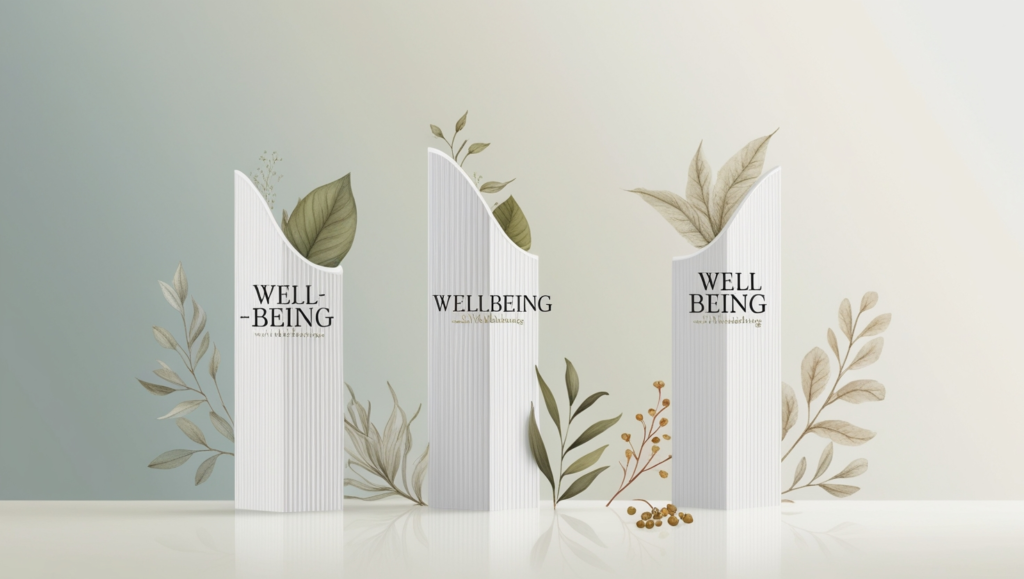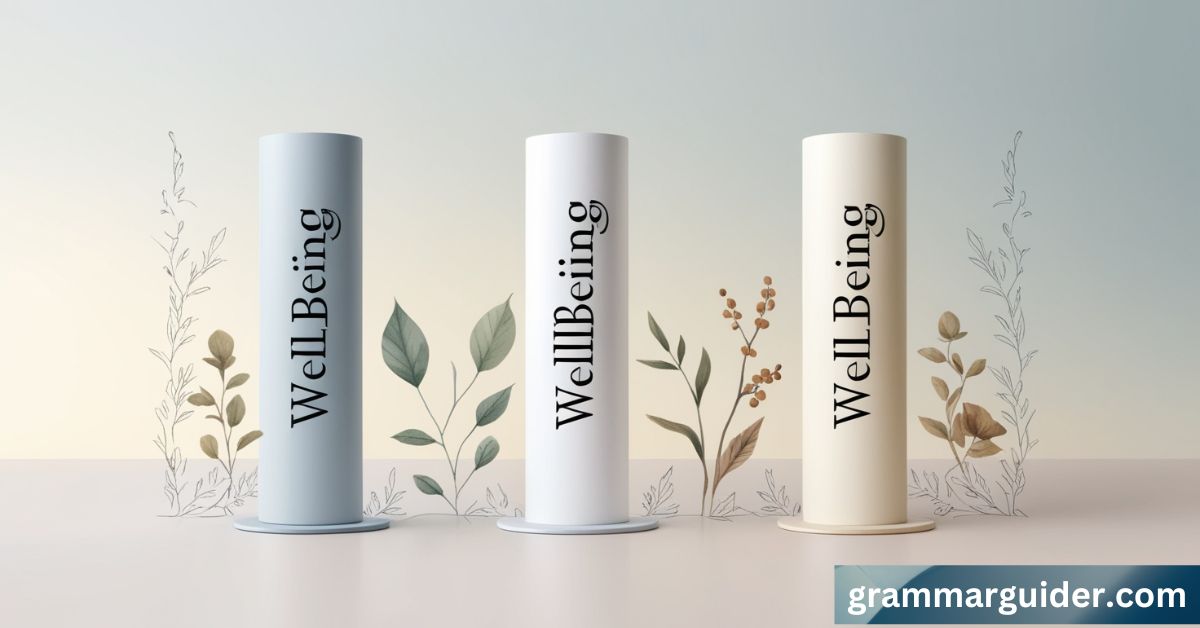Language can be tricky, especially when it comes to spelling, hyphenation, and different forms of words. A common point of confusion is well-being vs wellbeing, and well being. These three terms might seem similar, but they are used in slightly different contexts, and each has its own grammatical nuances.
In this article, we will explore the differences between these forms, providing clarity on when and how to use them. We’ll also include some real-world examples (like emails and conversations) to make the distinctions clearer.
What Does Well-being Mean?
First things first, let’s look at well-being with a hyphen. This term is used to describe a person’s overall health, happiness, and prosperity. It refers to an individual’s physical, emotional, and mental state.
Whether you’re talking about someone’s personal well-being or societal well-being, it encapsulates the idea of being in a state of balance and contentment.
Example Email: Well-being in a Professional Context
Subject: Checking in on Your Well-being
Dear Sarah,
I hope this message finds you well. I wanted to reach out to see how you’re doing lately. It’s been a busy few weeks, and I know you’ve been managing a lot. Please don’t hesitate to let me know if you need any support or adjustments to help maintain your well-being at work. We truly value your health and happiness.
Take care,
John
In this context, well-being is used to refer to Sarah’s overall physical and mental health, implying both her work-life balance and emotional well-being.
Understanding Wellbeing (No Hyphen)
Now let’s explore wellbeing written as one word, without a hyphen. This form is increasingly common, especially in British English, though it has gained popularity in American English as well. The wellbeing vs well-being debate largely centers on style and preference, with well-being often used in more formal writing and wellbeing appearing in casual contexts or when referring to larger, abstract concepts of general welfare.
Example Email: Wellbeing in a Personal Context
Subject: Thinking of Your Wellbeing
Hi Jessica,
How have you been? I was just thinking about our last conversation and wanted to check in on your wellbeing. I know you’ve been juggling a lot lately, and I hope you’ve had some time to rest and recharge. Let me know if you want to catch up soon.
Take care,
Amy
Here, wellbeing is used in a slightly more informal, personal context. The term still conveys the same concept as well-being but fits better in a casual, friendly message.
Well Being: The Unhyphenated Form
Well being written as two separate words is the least common form. In most cases, it is used when well functions as an adverb and being as a noun, typically in a philosophical or abstract sense. For instance, in statements like “The well being of the community is at risk,” the focus is on the state of existence or the condition of being well.
It’s important to note that the hyphenated form (well-being) is almost always the preferred version when referring to health, happiness, or overall state of a person.
Example Scenario: Well Being in Philosophical Context
Imagine you’re reading a book on philosophy:
“Well being is an essential condition of human life, often defined as a state where an individual’s needs are met, and their overall existence aligns with their values and desires.”
In this case, well being as two words is used more in a broader, existential sense. It is less common in everyday use but still correct in specific academic contexts.
Is Well Being Hyphenated? The Answer

If you’re wondering, “Is well being hyphenated?” the simple answer is no. When used as two separate words, well and being should not be hyphenated. However, keep in mind that this form is rarely used in modern English when talking about someone’s personal health or happiness.
Instead, well-being or wellbeing would typically be preferred for these meanings, as they are more commonly used in health, psychology, and social sciences.
Quick Recap of Hyphenation Rules:
| Term | Hyphenation Rule | Example Sentences |
|---|---|---|
| Well-being | Always hyphenated | “He’s focused on improving his well-being.” |
| Wellbeing | No hyphen, one word | “Yoga is great for mental wellbeing.” |
| Well Being | Not usually hyphenated, rare form | “The well being of society relies on equality.” |
The Grammar Debate: Is Well-being Hyphenated?
The question of is well-being hyphenated comes up frequently when trying to choose between wellbeing vs well-being. From a grammatical standpoint, well-being is the more traditional form.
Historically, the hyphen was used to clearly separate the two components of the term, signifying that it is a compound noun.
However, modern usage is evolving, and many style guides now accept wellbeing without the hyphen, particularly in contexts where the word is being used as a concept or philosophy rather than a medical term.
In academic writing, well-being might still be preferred, while in casual or corporate settings, wellbeing is increasingly common.
Scenario: Corporate Setting with “Well-being” and “Wellbeing”
Let’s look at an example in a corporate setting:
Subject: Workplace Well-being Initiatives
Dear Team,
As part of our ongoing commitment to employee well-being, we’ve launched a new program to support your mental and physical health. The program will provide resources on mindfulness, exercise, and work-life balance to improve overall well-being.
Please visit the new portal for more information.
Best,
Tom
In this email, well-being is used when referring to the health and happiness of the employees in a formal, corporate context. Wellbeing would be acceptable here as well, depending on the company’s style guide.
When to Use Which Term?
- Use “well-being” (hyphenated) when referring to personal, physical, or emotional health in more formal, academic, or professional writing.
- Use “wellbeing” (no hyphen) when writing informally or in situations where the compound word is more conceptual. It is also becoming more accepted in modern writing styles.
- Avoid using “well being” (separate words) unless you’re discussing a broader philosophical idea or are using it in an academic context.
Real-World Examples: Clarifying the Terms
To further clarify how each term is used in different contexts, here are more examples from everyday life.
Example 1: A Health Article
Well-being is often used in health articles or when talking about someone’s overall state of being. It may be used when discussing physical, emotional, or social aspects.
“Maintaining well-being involves balancing your emotional, physical, and mental health.”
Example 2: A Fitness Blog
In a more casual or lifestyle setting, wellbeing might be used.
“To improve your wellbeing, you should make sure to get enough sleep, eat a balanced diet, and exercise regularly.”
Example 3: A Philosophy Book
When discussing deeper philosophical ideas or theories, well being as two separate words could be appropriate.
“The well being of a person is often viewed as a state of alignment between their desires and their existence.”
Conclusion: Well-being vs. Wellbeing vs. Well Being
So, what have we learned? The debate between well-being vs wellbeing comes down to preference and context. In general, the hyphenated form (well-being) is the most widely accepted in both American and British English. However, wellbeing is gaining ground, especially in informal and conceptual contexts.
The form well being (separate words) is rare and should only be used in very specific situations, usually in philosophical discussions.

Harley Rose is a seasoned expert in English grammar and writing tips, blending years of knowledge and a love for language into her work. With a sharp eye for detail and a talent for making grammar accessible, Harley shares practical insights that help readers write with precision and flair. Her content is ideal for anyone looking to strengthen their writing skills and express themselves with confidence.

